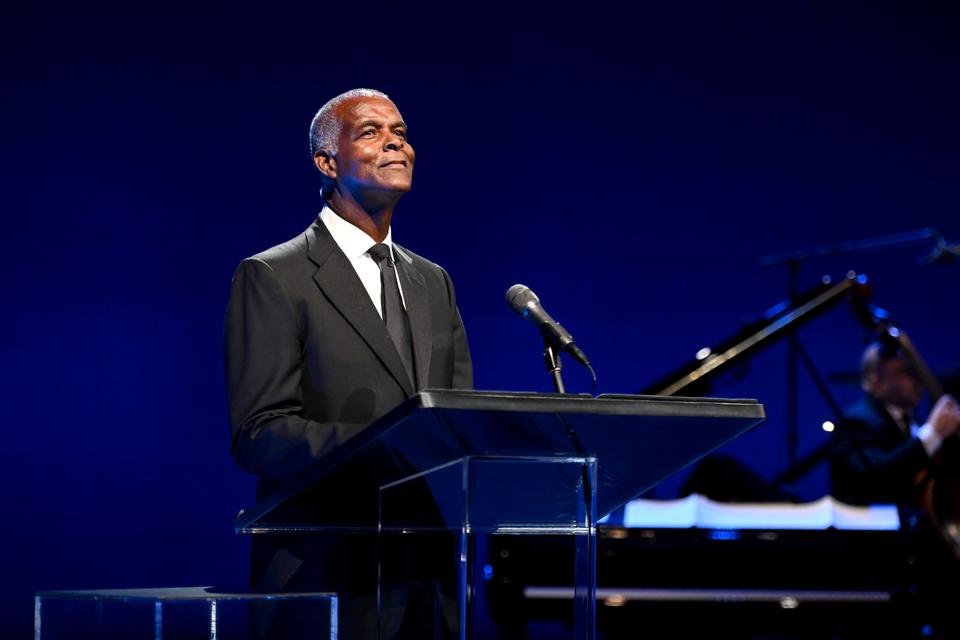My father was raised in Watts, a low-income community in south Los Angeles. For him, education was the key to a life free of fear. I remember him telling me stories about the neighborhood as a kid. He was fortunate to live in a two-parent household full of unconditional love and food on the table. When he stepped outside of the house, it was an entirely different world.
He had his punch spiked at a party when he was in elementary school. He witnessed people bleeding from getting stabbed at school. Four housing projects fed into his middle school, and four different gang affiliations were present in middle school alone. He was lucky to have dedicated teachers who enhanced his self-esteem. He was taught he could do anything.
Addressing Inequities
Many Black men from underserved communities don’t have the same experience. In 2020, 48% of Black children lived in a single-parent home.
“My dad left when I was 3 or 4. It was a disadvantage being a young African American boy having to recognize that my father rejected me. You grow up wondering, ‘What’s wrong with me?’ It causes you to doubt things about yourself,” says Dr. Charles Bray, who manages the small business programs office at NASA’s Jet Propulsion Laboratory. He is originally from the the east side of Joliet, Illinois, and says that not having a father impacted his mental health.
“I had to work through the self-esteem issues from not having a dad. If you have your dad around you have an advantage.”
Bray is one of many Black men to attend a prestigious university after being raised in a low-income household. The Illinois native studied electrical engineering at Purdue before getting an MBA from Harvard Business School, and two PhDs from Pepperdine. He hopes to educate the next generation of Black professionals.
“We need to teach our younger folks what we’ve learned. You have to embrace the tapestry of who you are as a Black man,” says Bray. “Pull the positive threads to craft the best version of yourself.”
Similarly, Clarence Otis Jr., the former CEO of The Darden Group, comes from a low-income area and has excelled in his career. Darden is a Fortune 500 company that owns restaurant chains like Ruth’s Chris, Olive Garden, and Yard House. In 2022, Darden’s net income was $955 million, and it’s one of the largest restaurant groups in the world. Otis ran Darden for 10 years, and is one of few Black men to ever be the CEO of a Fortune 500 company. He currently serves on corporate boards for Verizon, VF Corporation, and Travelers Corporation.
The retired businessman was raised in Watts and left after high school to get a political science degree from Williams and a JD from Stanford. He did well in school from a young age and credits his teachers for encouraging him.
“A key to my success is that I was well read from a very early age,” he says. “You could check out a maximum of ten books every two weeks from the public library branch in Watts on 103rd Street. I did that from third grade through eleventh grade.”
Combating Stereotypes
TV shows, movies, and music tend to focus on Black men who are suffering, but Black men in corporate America are changing the narrative.
“Black men are not a monolith. We are individuals uniquely and wonderfully made,” he says. “Some stereotypes are that we are angry, only marginally intelligent, and undisciplined. We live in a society that has perpetrated lies about us in order to exploit us.“
It should not come as a surprise that 24.9% of Black men in the United States have bachelors degrees. There are Black men who are surgeons. Others are lawyers. Some are at the helm of major companies.
There are currently eight Black executives at Fortune 500 companies, and it’s likely that some of them come from underserved communities. Although there has been an increase in Black executives, Black men in leadership say hiring practices need to change to increase socioeconomic diversity.
“Readers should know that in each of the difficult communities across the country they read about, there are dozens and dozens of kids, even today, that will succeed,” says Otis. “Readers are missing huge opportunities if they don’t seek those kids out and bring them into their organizations.’
Working Together
Landon Medlock, a director of product at an Edtech company in San Francisco, believes Black men should uplift each other in corporate spaces. Medlock was raised in a predominantly Black community in Dallas and received a scholarship to attend a local private school. The Stanford alum didn’t hold back while discussing how Black men are treated in corporate America.
“Widespread corporate success has eluded Black people and by extension Black men,” Medlock says. “We are in this corporate ladder. We should view success collectively,” he says. Medlock is just one of many people who believes the successes of Black men should be celebrated within the community.
Ron Taylor is a portfolio specialist at T.Rowe Price and is from the Crenshaw District in south Los Angeles. T.Rowe Price manages $1.2 trillion in assets and is the 15th largest asset manager in the world. Taylor believes that the accomplishments of Black men should be seen as wins for the entire community.
“When a Black professional rises within the highest levels of corporate America other Black professionals celebrate that,” he says. “Once someone sees it, they know it’s achievable for them. It is a beacon of light for us as a community in terms of what is possible.”

